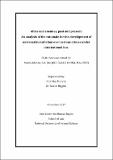Allies and enemies, past and present: An analysis of the rationale for the development of universal jurisdiction over serious crimes under international law

View/
Date
2017-11-08Author
Adanan, Amina
Metadata
Show full item recordUsage
This item's downloads: 194 (view details)
Abstract
Universal jurisdiction is a type of extraterritorial jurisdiction in international law. It permits any State to prosecute persons accused of committing certain abuses regardless of where the offence occurred and irrespective of the nationality of the accused person(s) or victim(s). The inhumanity of the act demands that the perpetrator be prosecuted, because he/she violates the common interests of the world community. As such, it is a rationale-based jurisdiction.
In recent years, States that exercise this jurisdiction have narrowed the scope of its application in their legal systems, by necessitating a link between the crime abroad and the State prosecuting the offence. This nexus is required through the nationality or residency of the alleged perpetrator(s) and / or victim(s). Moreover, in some States the powers of the public prosecutor in deciding whether or not a criminal investigation proceeds makes it impossible for victims of international crimes to seek justice. The result is a significant change in the exercise of universal jurisdiction that could potentially blur the distinction between it and other forms of extraterritorial jurisdiction. This situation raises an important question as to whether the reforms are in conformity with the underlying rationale for universal jurisdiction. What is more, it must be recalled that the primary responsibility for the prosecution of serious crimes under international law rests with States. From the point of view of preventing impunity, it is important that the modern rationale of universal jurisdiction is identified, given that the other principles of jurisdiction in international law, namely the territorial, active and passive principles are not as far reaching as the universality principle.
This doctoral research does three things. First, it provides a comprehensive analysis of the rationale for the development of universal jurisdiction over the crimes to which it applies. It should be noted that the crimes within the scope of the thesis are those that are deemed serious crimes under international law. Second, this thesis compares the original rationale for universal jurisdiction to the exercise of the jurisdiction today. In particular, it includes a detailed examination of the laws providing for universal jurisdiction in Belgium. Third, this thesis provides an analysis of how universal jurisdiction developed over international piracy and then transposed to other crimes. To this extent, the thesis provides an overview of the common themes in the history of universal jurisdiction. This research uses a traditional doctrinal method, as well as a historical methodological approach using materials gathered from the Belgian Diplomatic Archives and the UK National Archives.
Collections
Except where otherwise noted, this item's license is described as Attribution-NonCommercial-NoDerivs 3.0 Ireland
Related items
Showing items related by title, author, creator and subject.
-
Transitional justice in Timor-Leste: Done and dusted?
Heinrich, Stefanie (2014-04-01)This thesis discusses a transitional justice framework that is derived from United Nations Secretary-General Kofi Annan`s report The Rule of Law and Transitional Justice in Conflict and Post-Conflict Societies, published ... -
Hate Speech and Incitement in International Criminal Law
Timmermann, Wibke Kristin (2011-09-27)This thesis critically analyzes the status of hate speech and incitement in international criminal law. It begins by examining the harm and dangers of hate speech. Firstly, the danger of public hate propaganda is considered ... -
The Dehumanisation Dynamic: A Criminology of Genocide
Anderson, Kjell (2011-10-03)Why do individuals perpetrate the crime of genocide? This thesis utilises an interdisciplinary, criminological approach in order to explore this question. Interviews with perpetrators and victims of genocide in Rwanda, ...

